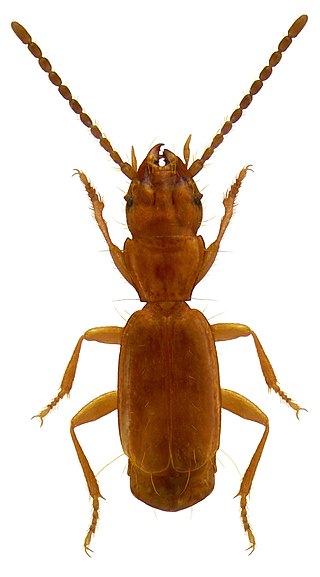A genus–differentia definition is a type of intensional definition, and it is composed of two parts:
- a genus : An existing definition that serves as a portion of the new definition; all definitions with the same genus are considered members of that genus.
- the differentia: The portion of the definition that is not provided by the genus.

Weasels are mammals of the genus Mustela of the family Mustelidae. The genus Mustela includes the least weasels, polecats, stoats, ferrets, and European mink. Members of this genus are small, active predators, with long and slender bodies and short legs. The family Mustelidae, or mustelids, is often referred to as the "weasel family". In the UK, the term "weasel" usually refers to the smallest species, the least weasel (M. nivalis), the smallest carnivoran species.
Genus is a taxonomic rank used in the biological classification of living and fossil organisms as well as viruses. In the hierarchy of biological classification, genus comes above species and below family. In binomial nomenclature, the genus name forms the first part of the binomial species name for each species within the genus.

The Pterophoridae or plume moths are a family of Lepidoptera with unusually modified wings. Though they belong to the Apoditrysia like the larger moths and the butterflies, unlike these they are tiny and were formerly included among the assemblage called "microlepidoptera".

The Old World rats and mice, part of the subfamily Murinae in the family Muridae, comprise at least 519 species. Members of this subfamily are called murines. In terms of species richness, this subfamily is larger than all mammal families except the Cricetidae and Muridae, and is larger than all mammal orders except the bats and the remainder of the rodents.

The Carangidae are a family of ray-finned fish that includes the jacks, pompanos, jack mackerels, runners, trevallies, and scads. It is the largest of the six families included within the order Carangiformes. Some authorities classify it as the only family within that order but molecular and anatomical studies indicate that there is a close relationship between this family and the five former Perciform families which make up the Carangiformes.

Emys is a small genus of turtles in the family Emydidae. The genus is endemic to Europe and North America.
In botanical nomenclature, author citation is the way of citing the person or group of people who validly published a botanical name, i.e. who first published the name while fulfilling the formal requirements as specified by the International Code of Nomenclature for algae, fungi, and plants (ICN). In cases where a species is no longer in its original generic placement, both the authority for the original genus placement and that for the new combination are given.
Rubivirus is a genus of viruses. It contains three species.

Cyclanorbis is a genus of softshell turtles in the family Trionychidae. The genus is endemic to Africa.

Kinixys is a genus of turtles in the family Testudinidae. The genus was erected by Thomas Bell in 1827. The species in the genus Kinixys are native to Sub-Saharan Africa and Madagascar and commonly known as hinged tortoises or hinge-back tortoises.
Paracrocidura is a genus of shrews. They are mammals in the family Soricidae. The vernacular name large-headed shrews is sometimes collectively applied to the genus, but has also been applied to the species Crocidura grandiceps.

Actinemys is a small genus of turtles in the family Emydidae. The genus is endemic to the west coast of North America. The genus contains two species.

In biology, taxonomic rank is the relative level of a group of organisms in an ancestral or hereditary hierarchy. A common system of biological classification (taxonomy) consists of species, genus, family, order, class, phylum, kingdom, domain. While older approaches to taxonomic classification were phenomenological, forming groups on the basis of similarities in appearance, organic structure and behaviour, methods based on genetic analysis have opened the road to cladistics.

Aepus marinus is a species of beetle in the family Carabidae. It is found in the intertidal zone of marine habitats in northwestern Europe where it lives in crevices and under stones. The adult beetle is about 2.5 mm (0.1 in) in length, and is a reddish-yellow colour.
Aepus robinii is a species of beetle in the family Carabidae.
Alphasphaerolipovirus is a genus of double stranded DNA viruses that infect haloarchaea. The genus contains four species.
Hukuchivirus is a genus of double-stranded DNA viruses that infect thermophilic bacteria. The genus was previously named Gammasphaerolipovirus.










